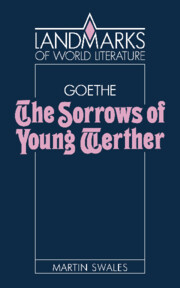Summary
The tradition of the German novel, before the emergence of its ‘classic’ writers in the first half of the twentieth century (Thomas Mann, Kafka, Hesse, Musil), does not have an assured place in the canon of European literature. Not that it has wanted for spirited advocates; but, despite all efforts, it has remained firmly on the periphery. The one signal exception is Goethe's novel Die Leiden desjungen Werthers (as the title was given in the first edition) or (as most subsequent printings have it) Die Leiden desjungen Werther. The title (with or without the genitive form ending in ‘–s’) is usually rendered as ‘The Sorrows of Young Werther’ – and I shall have a word to say about that translation in the main text. Werther was an extraordinary and immediate bestseller both in Germany and abroad. For this reason, one does not have to plead for its importance: it is, as it were, already on the map. But even so, it does pose interpretative problems for us as modern readers. There is, for example, the fact that Werther was, as I shall show, very much rooted in contemporary taste: and it may be that some modern readers will find that they can only view it as a quaint museum piece. This has not been my experience in teaching the novel. My students at University College London have found Werther an exciting and troubling text – one that produces strongly divergent opinions.
- Type
- Chapter
- Information
- Goethe: The Sorrows of Young Werther , pp. viiPublisher: Cambridge University PressPrint publication year: 1987

